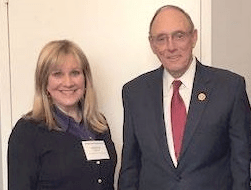Alzheimer’s Tennessee’s headquarters in the heart of Bearden is a modern, purple-signed office building nestled on Kingston Pike just west of the elementary school. From here, and in workshops and gatherings across surrounding counties, the people of this East Tennessee not-for-profit assist thousands of patients and families who are dealing with Alzheimer’s disease and related dementias.
Janice Wade-Whitehead has been the president and CEO of the organization since 1991. The Knoxville native was working in not-for-profit management in Nashville when her mother received a diagnosis of Alzheimer’s disease. Wade-Whitehead moved back to Knoxville.
“It was time to come home,” she says. Her mother passed away in 1996.
Since her own experience with caregiving for someone with the disease, Wade-Whitehead has been instrumental in advocacy for the Alzheimer’s community. She was appointed by Gov. Phil Bredesen in 2007 to the Tennessee Alzheimer’s Disease Task Force, where she helped create the first Tennessee State Plan to address the disease. She now serves on the Tennessee Commission on Aging & Disabilities. Recently, she has been advocating for funding for research into the disease and is urging the creation of another 10-year plan.
Thanks to medications that are effective in slowing the progression of the disease in the early stages, and thanks to diagnoses at earlier stages, more people are living with the disease for longer with less impairment. When she began her position, Wade-Whitehead says, most calls to the office were from caregivers.
“Now a lot of our calls are from people who think they are having memory problems,” she says.
Soon the website will have both a “Caregiver Academy” and a “Live Well Academy” for those who have the diagnosis.
“We want them to live well with this disease as long as they can,” says Wade-Whitehead. There is also an in-person memory support group for this population.
“There’s nothing like talking with someone who is going through it,” she says.
Research into therapies that will slow, halt or abolish the disease is vital, Wade-Whitehead says, particularly as baby boomers age into vulnerability for the disease.
“We can either invest in the research that would save the baby-boomer generation, or we can invest in their care,” Wade-Whitehead says. There simply aren’t enough caregivers, enough facilities, enough healthcare for the tsunami that will come if nothing is done, she says. “Investing in research is much more feasible.”
For baby boomers who want to do their part to further understanding and treatment, Alzheimer’s Tennessee is connecting locals with an important nationwide clinical trial, the Generation Program. Conducted by VRG/NOCCR research group at the University of Tennessee Medical Center, this Novartis study is looking for subjects 60 to 75 years old who show no signs of cognitive impairment. Call 865-305-3784 for more info.
Wade-Whitehead is also excited about research being led by Xiaopeng Zhao in UT’s Department of Mechanical, Aerospace and Biomolecular Engineering, in which people with a diagnosis of mild cognitive impairment will be monitored with interactive brain imaging as they focus sustained attention on images to see if neural networks can be strengthened with this kind of intervention. Look for more information about this “neural pathways” research soon.
Alzheimer’s Tennessee is fortunate to have a great deal of community support, from participation in annual walks to special fundraisers to regular endowments and donations. It is also critical that people speak up in support of research that will “make Alzheimer’s a memory,” to use the group’s mission statement.
Advocacy works, Wade-Whitehead says. She and other Tennessee volunteers met with members of Congress last fall to encourage increased research funding at the National Institutes of Health. Congress later passed a $425 million increase. In February, she and other volunteers will journey to Nashville to talk to state lawmakers about the ways that they can help Tennessee families.
“We really need people to add their voices to the advocacy component. It’s crucial that lawmakers hear from their constituents,” she says.
Alzheimer’s Tennessee is at 5801 Kingston Pike. Info: www.alztennessee.org. There is also a round-the-clock helpline at 800-259-4283.

